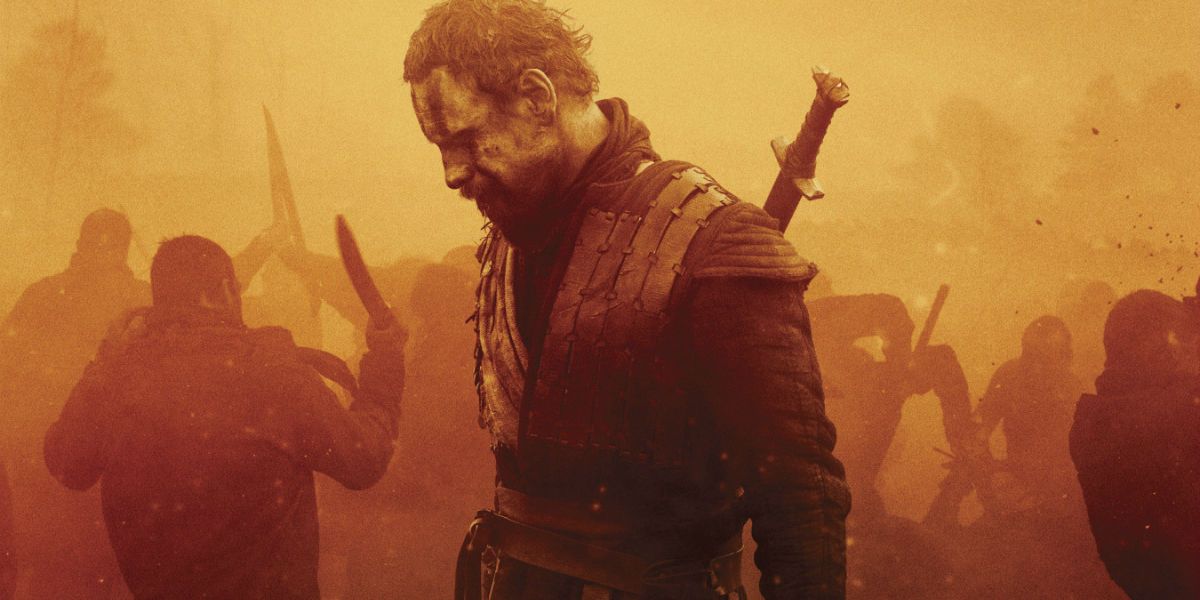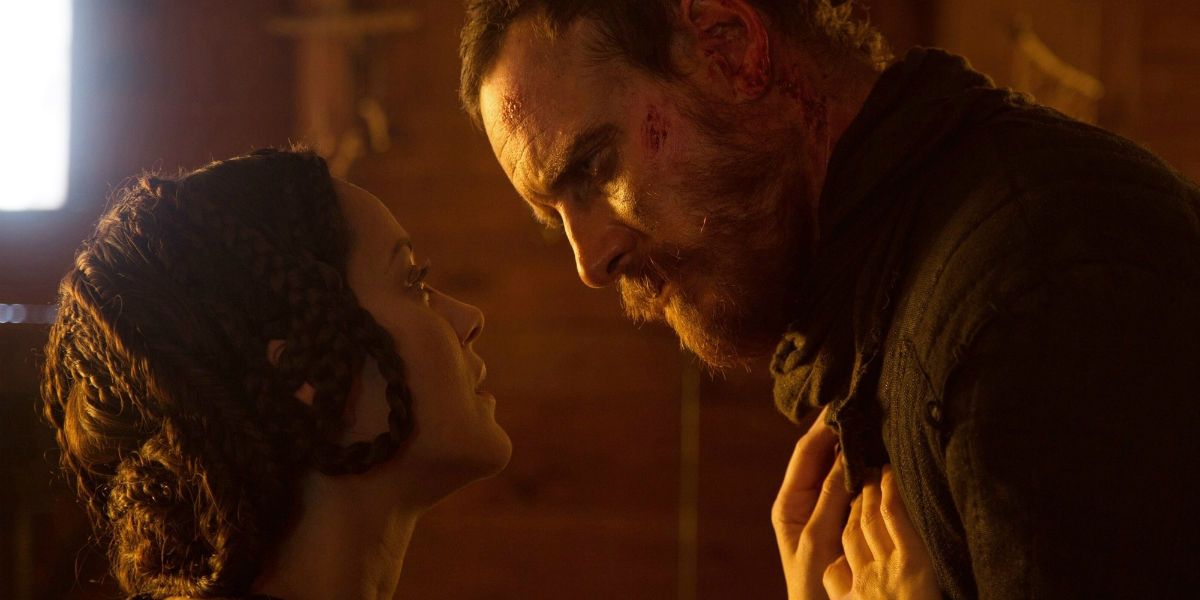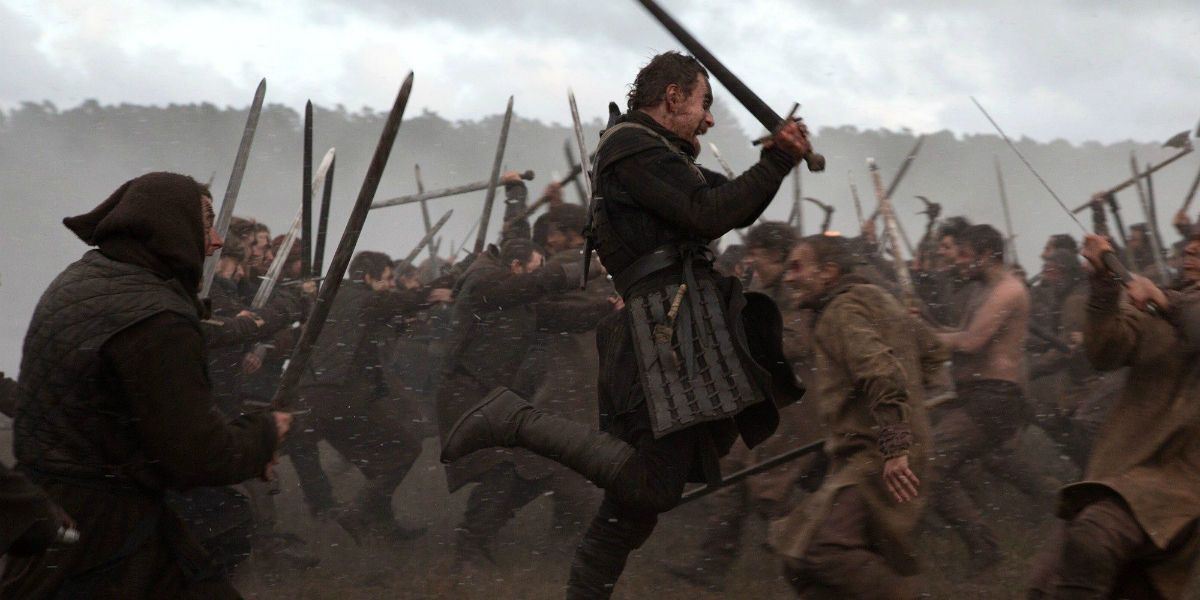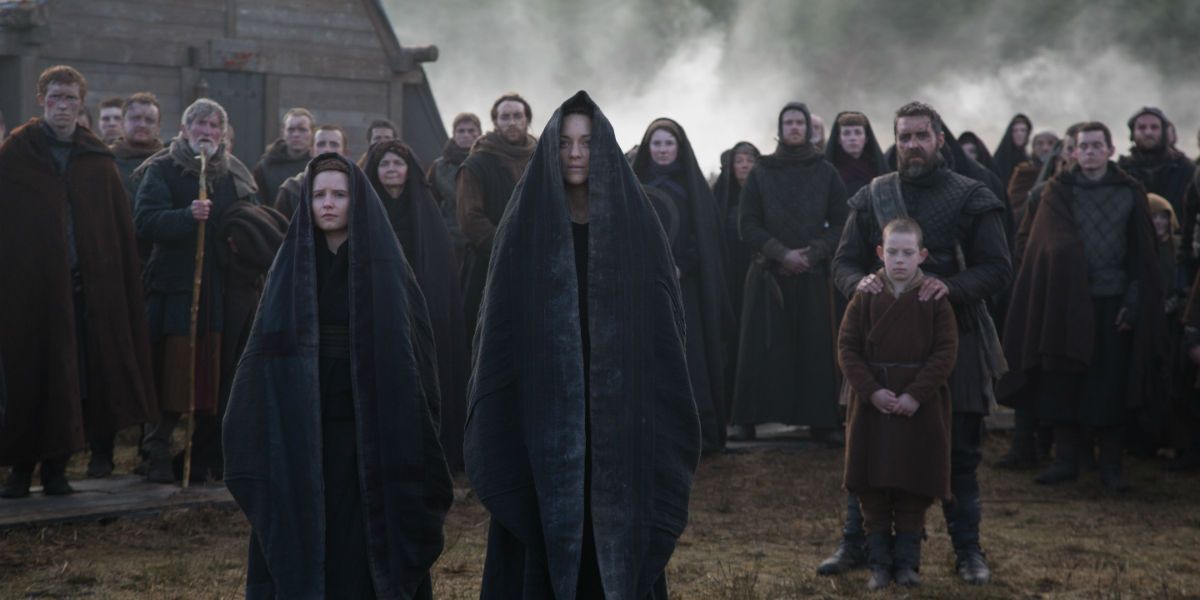Macbeth is an effectively grim and well-acted Shakespeare adaptation, but prioritizes style over substance.
Macbeth retells the tale of William Shakespeare's Lord Macbeth (Michael Fassbender), a Scottish noble and brilliant military strategist who emerges victorious after leading his king's troops into battle against rebellious forces in a larger civil war. However, shortly after the battle is won, Macbeth and his comrade Banquo (Paddy Considine) are approached by three mysterious women (accompanied by a young girl and infant) who then prophesize that Macbeth will become the Thane of Cawdor and, in time, the King of Scotland. The first half of their prediction soon comes true, as King Duncan (David Thewlis) rewards Macbeth for his valor with the Thane of Cawdor title.
Lady Macbeth (Marion Cotillard), upon learning of this prophecy, encourages her husband to fulfill his "destiny" and kill the king himself, rather than allow the crown to pass to Duncan's heir, Malcolm (Jack Reynor). Macbeth eventually does the deed and takes the throne, but soon finds himself wrought with paranoia about his own legacy - prompting suspicion from his peers, including Banquo as well as Lord Macduff (Sean Harris), and in time leading Macbeth and his wife further down a dark path of madness, murder, and betrayal, from which there may be no escape.
Directed by Justin Kurzel (The Snowtown Murders), Macbeth is the moodiest and most grueling movie adaptation of The Bard's classic work to date - one that streamlines the original play's dialogue and in turn instills the tragedy of Macbeth with a broodier atmosphere and more savage violence. As a result, the film brings to mind the arthouse design of Nicolas Winding Refn's grisly Viking tale Valhalla Rising more than any past big screen take on Macbeth. The final result is an uneven, but all the same visually striking piece of cinema that successfully leaves an impression (if a mixed one).
The adapted Macbeth script from playwright/screenwriter Michael Lesslie, as well as the screenwriting duo Jacob Koskoff and Todd Louiso (The Marc Pease Experience), carries over the broad strokes of the original Shakespeare text. However, the film also re-frames the central narrative of The Bard's play by opening with the death of Lord and Lady Macbeth's child - suggesting that the pair's subsequent grief and spiritual disillusionment from their personal loss fuels their vile actions as much as ambition or the lust for power does (if not more so). This added layer of thematic meaning both enhances and detracts from the main storyline in equal measure, as does the film's attempt to further emotionally ground its characters by examining things like, say, Macbeth's post-traumatic stress from his time in the war. As such, though Macbeth gets points for trying, it falls short at re-imagining its source play in a way that brings out newfound meaning.
Macbeth thus winds up being most dramatically-compelling when it focuses solely on the performances of its leads - who, no surprise, prove to be more than capable of delivering Shakespeare's monologues in a captivating fashion. The film does chop up a number of the conversations penned by The Bard (as was mentioned before), but when it allows Fassbender and Cotillard to speak in long and uninterrupted takes, the results are mesmerizing. Both leads subtly bring a sense of emotional weightiness and authenticity to their roles - portraying the Macbeths as two people who are as tormented as they are ruthless in their nature, as a result. Problem is, because the pair are shown as being heavily damaged (and, in different ways, blood-thirsty) from the beginning, their subsequent character arcs feel flat and lose their tragic scope.
Script problems aside, Macbeth is a gorgeous-looking film thanks to the efforts of Kurzel and his frequent collaborators - including, director of photography Adam Arkapaw and production designer Fiona Crombie. Arkapaw's approach here brings to mind his work on True Detective season one, giving rise to a movie rife with dazzling snapshots and creative lighting schemes that use a rich color palette ranging from grungy brown to hellish yellow. The film's battlefield sequences in turn blend 300-inspired stylistic flourishes (slow-motion shots for dramatic purposes) with modern handheld camerawork, as to create close-quarter combat scenes that are gritty and raw, yet noticeably stylized. Between that and the editing by Oscar-winner Chris Dickens (Slumdog Millionaire), who often cross-cuts different lines of action together in an effective manner, Macbeth feels as cinematic as any Shakespeare adaptation can.
Macbeth was also largely filmed on location in England and Scotland, and the movie's various settings (rolling hills covered in fog, historical sites like Bamburgh Castle) help to further maintain a dreary and bleak atmosphere throughout the three-act narrative. While the film is well-served by its relentlessly ominous mood at times, the effect is suffocating at other times - and thus, the film comes off as being overly solemn and too self-serious, as a whole. Macbeth's tone is likewise so unwaveringly gloomy that every moment in its narrative winds up being treated with the same intensity, whether it's appropriate or not. Ultimately, as beautiful looking as Macbeth is, its story ends up feeling like a secondary concern to the visuals.
The traditional side players in Macbeth are very much still supporting characters here too, though some of them are more thinly-drawn than in the original Shakespearean text (as a result of the stream-lined adapted script). Nevertheless, they are brought to life by a talented crew of character actors, including Paddy Considine (The World's End), Sean Harris (Mission: Impossible - Rogue Nation), David Thewlis (The Theory of Everything), and Elizabeth Debicki (The Great Gatsby). Macbeth is first and foremost a showcase for Fassbender and Cotillard, but most of the supporting crew are given a moment to shine - which they do.
When all is said and done, Macbeth is an effectively grim and well-acted Shakespeare adaptation, but prioritizes style over substance. The film's directorial style and approach to adapting the famous play by The Bard is commendably ambitious in its design, but only partly successful at painting the tragedy of Lord Macbeth in a fresh light. All the same, there's enough that works here to make Macbeth worthy of a recommendation for those in the mood for a new take on Shakespeare's work - or, failing that, those who are curious about what Kurzel will bring to the table as director on the upcoming Assassin's Creed video game movie adaptation.
TRAILER
Macbeth is now playing in select U.S. theaters. It is 113 minutes long and is Rated R for strong violence and brief sexuality.
Let us know what you thought of the film in the comment section below.




